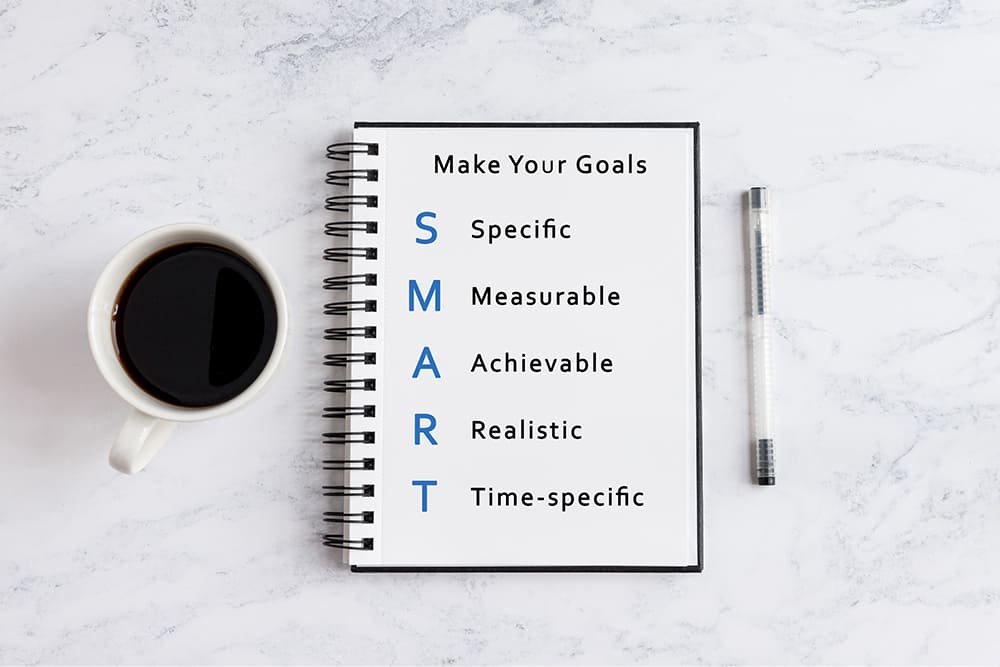The Importance of Setting Goals
Introduction
If you've ever dreamed of the enhancing the quality of your life with any chronic illness or sleep disorder, then this article is for you. You'll discover how setting personal goals can help you make positive changes to your life and help you start living the life that you deserve.
It's important to know exactly what you want to achieve and the period of time it’ll take to manifest that achievement. With clarity comes concentrated effort and an ability to weed out diverting distractions. According to Edwin Locke's famous goal setting theory, the more challenging and specific a goal, the more likely it will be achieved. So think big but keep it realistic!
What is a Goal
Elliot and Fryer define a goal as “a cognitive representation of a future object that the organism is committed to approach or avoid”. This simply means that it is a mental image of a future scenario that a person aims to achieve or avoid. Many studies have been conducted on successful goal striving and has shown that there are significant links to subjective well-being. One meta-analyses suggests that goal-setting interventions can help improve a wide range of behaviours that include learning, job search, and physical activity.
Goals also have a number of other positive effects that are relevant to people living with sleep disorders like narcolepsy. Here are three important benefits:
Goals help you focus. They help direct your attention and effort toward relevant activities and just as importantly help to keep your focus away from goal-irrelevant activities.
Goals have an energising effect and fuel motivation. Setting goals creates a sense of urgency which has the effect of energising you and creating motivation to reduce the gap between the current state and the desired goal state. This energising effect is further enhanced when the self-confidence that is gained by reaching them further drives motivation to continue pursuing new goals.
Goals increase learning. When you start to pursue a goal, you gain new insights, gather new information, and learn how to apply new strategies to help achieve the things that matter most to you.
“The trouble with not having a goal is that you can spend your life running up and down the field and never score.” - Bill Copeland
How do you start setting the right goal?
Many people who struggle when living with sleep disorders like Narcolepsy, never get around to setting goals that they can work towards to improve the quality of their life. Knowing what you really are trying to achieve and setting the right type of goal is a critical first step in making positive changes in your life.
Setting the right goals allows you to create the plan that will lead you to the destination you have in mind. The plan itself is a critical part of the goal achievement process and you may be familiar with the saying, “A goal without a plan is just a dream.” If you haven’t taken the time to set the right goal, then you barely will have a dream to work towards.
There are so many things to learn about Goal Setting and Goal Achievement and the more you understand, the greater your chances of reaching your own personal goal. As with all things though, the best way to start is by keeping things simple but effective.
One of the best ways to guarantee goal-setting success is to ensure that each of your goals fits the SMART formula. SMART is an acronym that stands for Specific, Measurable, Achievable, Realistic and Timely.
When your goals have these characteristics, you are much likelier to achieve them. The secret is to make your goals more concrete.
Setting short term, medium term, and long term goals for yourself is a key to success in your life. If there are things that you want to achieve or ways that you want to grow, setting goals as stepping stones is an important part of getting there.
Follow this strategy to set SMART goals:
1. Make your goals specific
Specific goals have a clearly defined end-state. Examples include losing ten pounds, launching your own business, and running 5 miles. This is in direct contrast to nonspecific goals which are ambiguous or that make it difficult to establish the actions or performance required to achieve them. Examples of non-specific goals include feeling more energetic, becoming healthy, losing weight and earning money.
A common type of a non-specific goal that will certainly be familiar is the is the goal of “doing your best”. This is an example of where an end state lacking completely. Your goal should be numbers based, or have a specific end state. They should avoid any vague phrasing that can be left open to interpretation.
The creation of non-specific versus specific goals has different consequences. Research show that non-specific goals are seen as less difficult and more attainable compared to specific goals. This enables people to adopt them more easily. They are also less likely to result in feelings of failure, which in turn reduces goal abandonment.
The negative consequence of setting non-specific goals, is that it leads to less commitment and are more likely to be revised. It also results in a greater variance in outcomes and can also produce a lower performance overall.
The more specific your goals are, the greater level of commitment you will have and the clearer it will be when you finally achieve them.
2. Ensure that your goals are measurable
This is another reason why smart goals are numbers based or outcome based. To know whether or not you achieved a goal, you must be able to measure your progress. SMART goals are goals that you can track and measure that have a clear end or point of attainment.
Being able to measure your progress is important in goal setting and goal achievement. It helps you determine whether or not you're moving in the right direction, since you can clearly track and measure both positive and negative progress along the way.
As you begin working towards your new goals, measure your progress. Create benchmarks that will keep you on track. Having interim targets will give you something to shoot for each day while you're tackling a long-term project or goal.
3. Your goals should be attainable
SMART goals are goals that you can actually attain. They're not extremely farfetched goals like "Lose 100 pounds in 90 days" because if there's no way to achieve the goal, why set it? SMART goals are goals that you're physically and mentally capable of achieving.
The key is to understand your capacity. Make your goals challenging enough to be meaningful, but still feasible if you put in the required time and work.
4. Make your goals are realistic
SMART goals are not only attainable, but they are realistically attainable. They are a combination between a specific achievement that you can reach and a time frame that realistically coordinates with that achievement. A goal such as "I want to achieve the same amount of deep sleep as someone not living with a sleep disorder without the use of medication" is simply not realistic. Referring back to the weight loss example we used as an example of a goal that is unattainable, a SMART goal would be "Lose 10 pounds in 90 days," for a healthy weight loss of 3 to 4 pounds per month, rather than "Lose 10 pounds this week."
5. Goals should also be timely
Your SMART Goals should have time frames, and realistic ones at that. When you put a realistic time frame on your goal, it gives you something to work for. To simply "Lose 10 pounds," without a time frame lacks motivation. "Lose 10 pounds by my birthday" has a realistic time frame that gives you something to work for and a date for completion.
Working towards a deadline will help you keep your goals in sight. You'll be less likely to let daily obligations stand in your way.
Bottom Line
Setting SMART goals is a great place to start when setting out to achieve what you want in life. By setting goals that are specific, measurable, achievable, realistic, and timely, you are more likely to achieve the positive changes that you deserve! Failing to set the right goals, in the right way, will most likely result in goal abandonment which in turn will lead to a reduction in confidence, self-belief, self-worth and motivation. These are the last thing that anyone needs, especially when you are already working hard to manage the wide range of impacts that sleep disorders create.
Mastery over the various other goal setting and achievement strategies will further increase the likelihood of achieving positive change in your life. Investing your time in both learning and mastering these important skills and tools is invaluable to your life with narcolepsy.
There is a reason that the beginning of any professional coaching relationship involves a clear focus on the entire goal setting process. Without clear goals and measurable outcomes, we would never know if you are on track and actually making progress. We simply can’t create a plan for transformation without a SMART goal established nor can we celebrate micro-successes along the journey.
Coaching with the Narcolepsy Life Academy
Coaching with the Narcolepsy Life Academy provides a blend of traditional coaching and a mentor/consultant relationship. Specialising in lifestyle optimisation for people living with narcolepsy and other sleep disorders, the journey of transformation often involves a greater amount of information and strategies to be shared than in a more formal coaching partnership.
Each relationship is unique and the level of knowledge and understanding of lifestyle strategies varies between clients. For this reason the ratio of education to the facilitation of conversations helping clients to gain insight and awareness also varies. What remains consistent is the support, motivation and cultivation of awareness for each client.
If you would like to find out more about coaching and how we can help you to start living your best life then please feel free to contact us. We would love to speak with you.

